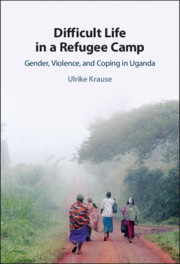Crossref Citations
This Book has been
cited by the following publications. This list is generated based on data provided by Crossref.
Jaji, Rose
and
Krause, Ulrike
2022.
Exklusives Flüchtlingsschutzregime, koloniale „Andere“ und Geschlechterdichotomien.
Zeitschrift für Friedens- und Konfliktforschung,
Vol. 11,
Issue. 2,
p.
195.
Krause, Ulrike
2022.
Geflüchtete Frauen.
p.
23.
Ruzibiza, Yvette
and
Berckmoes, Lidewyde H
2022.
Making ‘The Process’: Sexual Vulnerability and Burundian Refugee Boys and Young Men’s Strategies for Onward Migration from Nakivale Refugee Settlement in Uganda.
Journal of Refugee Studies,
Vol. 35,
Issue. 3,
p.
1186.
Müller, Anna-Lisa
and
Tuitjer, Leonie
2023.
Editorial: Infrastructures and migration.
Geographica Helvetica,
Vol. 78,
Issue. 4,
p.
559.
Sarkin, Jeremy
and
Morais, Tatiana
2023.
Cost-benefit Assessment of Refugee and Asylum-Seeking Women Reporting Sexual and Gender-based Violence in Uganda: Assessing Women’s Resilience as a Means to Protect their Ethno-religious Group.
Southern African Public Law,
Ekanayake, Anoji
Lakshman, Rajith
Blitz, Brad K.
Aghapouri, Jiyar
Javed, Amna
Malik, Maria
and
Rahim, Kiran
2023.
Gender and Forced Displacement in Humanitarian Policy Discourse: The Missing Link.
Journal on Migration and Human Security,
Vol. 11,
Issue. 3,
p.
243.
Morais, Tatiana
2023.
Addressing the Continuum of Violence with a Continuum of Resilience. Book Review ‘Difficult Life in a Refugee Camp: Gender, Violence, and Coping in Uganda’. By Ulrike Krause.
Journal of Refugee Studies,
Vol. 36,
Issue. 4,
p.
1020.
Grittmann, Elke
Hess, Sabine
Koopmann, Ulrike
and
Schwenken, Helen
2023.
Gender, Flucht, Aufnahmepolitiken.
p.
1.
Spiegel, Samuel J.
Mucherera, Blessing
Idrees, Sidra
Moze, Francesco
Rajadhyaksha, Kanak
McAteer, Boel
Mutambasere, Thabani
Cole, Georgia
Falisse, Jean-Benoit
and
Qadir, Savan
2024.
Displacement, Borders, and Unsettling Narratives.
p.
11.
Krause, Ulrike
and
Segadlo, Nadine
2024.
Surviving Exile. Queer Displaced People’s Lived Experiences of Aid, Risks and Coping in Kakuma.
Gender Issues,
Vol. 41,
Issue. 4,
Edler, Hannah
Krause, Ulrike
and
Segadlo, Nadine
2024.
‘We are creating peace’: everyday peace practices of displaced women in Kenya and Germany.
Conflict, Security & Development,
p.
1.



